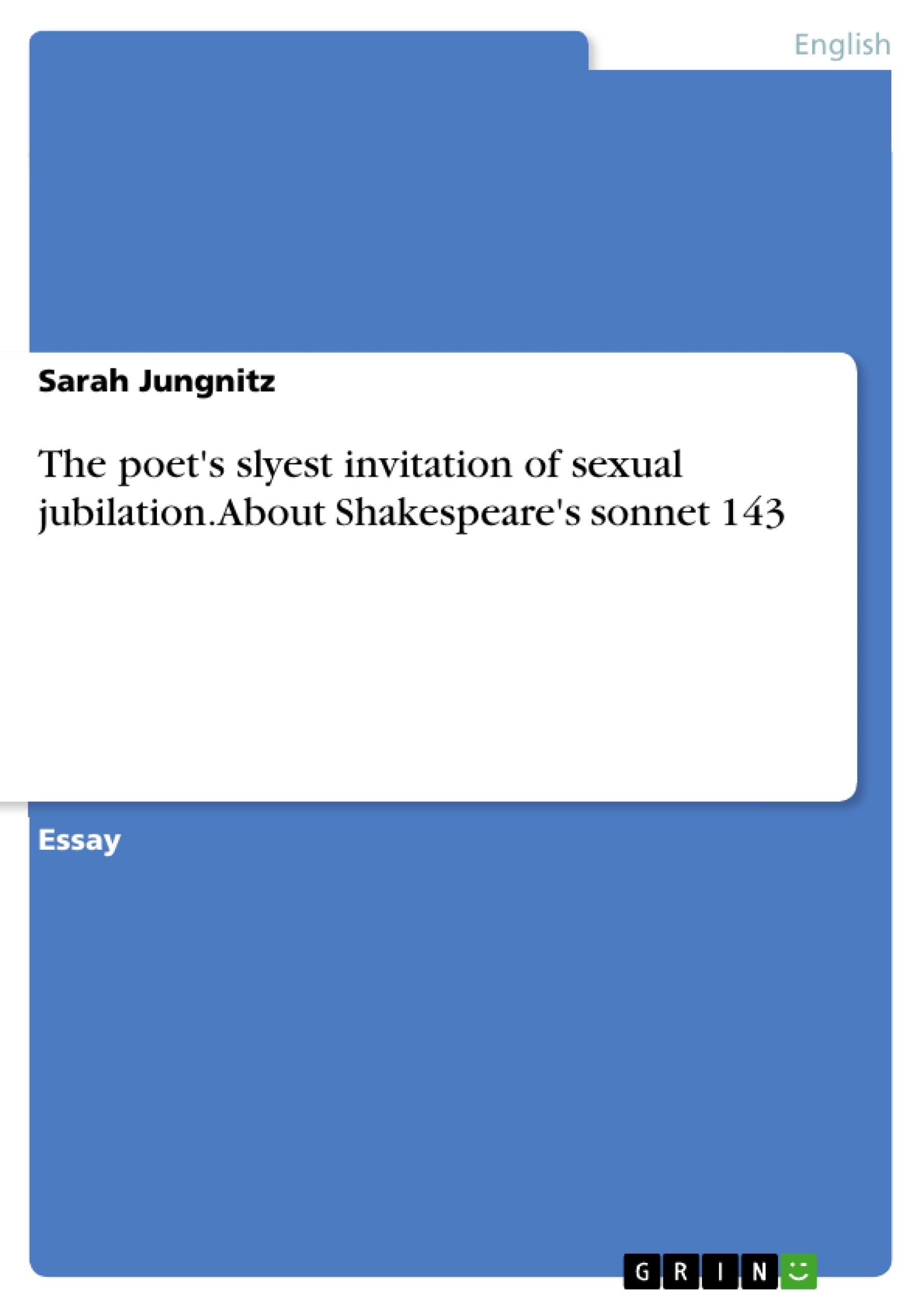The Sonnet 143 is one of Shakespeare's most inventful ones. Simultaneously it is as one of the dark lady sonnets fixed in a way. Without the knowledge of this classification it could also be the `farm-sonnet`. The poet feels attracted to the dark lady, who feels in turn attracted to 1another `person`. A chase takes it course. It is a horizontal chase, which has to end up, if there is no interruption, after a long while at the same place, if the reader can trust the idea of a circle of desire. This image Shakespeare sets in the heads of them. But in contrast to other chasings, this is not about fear, it is about love and the longing for touching. There is also no one, who runs away from the mouth smell of the dark lady. In this sonnet, the dark lady is presented as a 'housewife'. So she would know a lot about caring. Besides the poet describes her as careful, which means that she is able to provide herself, but this said nothing about if the poet likes that. Deftly in pressing on the glands, Shakespeare displays himself in the lonely offside. Instead of compassion, it is necessary to ask the question, how much the poet manipulates his own figure. Moreover the question, if Shakespeare is a misogynous poet has to be answered. This term paper will try to give an answer.
Table of Contents
- The poet's slyest invitation
- First of all, the sonnet 143 is a classical 14 line sonnet with three quatrains and a couple.
- Therefore a development in the sonnet can be recognizes: From the course to the reproach, Shakespeare mitigates it in the end with the prospect of hope.
- According to the rhetorical aspects of the sonnet, the repetition of the word 'fly' is remarkable.
- In the sonnet 142 Shakespeare admits in front of the dark lady, that love is his sin (Sonnet 142 1.1).
- Apart from the interpretation above, there are other variants of reading.
- In the light of the philosophical paradigm of that time the sonnet 143 operates with moral reprehensible contents.
- The critic Helen Vendler assumes that the poets 'mother' has a new lover, because of the variations in the figure of the 'feather'd creature'.
- In Conclusion I can say that Shakespeare does embody a misogynous poet, because he is insidious to get what he wants.
Objectives and Key Themes
This term paper aims to analyze Shakespeare's Sonnet 143 and explore its implications for understanding the poet's perspective on love, desire, and relationships. The paper delves into the sonnet's structure, language, and imagery to decipher the poet's motivations and attitude towards the "dark lady."
- The complexities of desire and its pursuit
- The portrayal of the "dark lady" and her role in the sonnet
- The use of language and imagery to convey emotional states
- The interplay of power dynamics and manipulation in relationships
- The potential for misogynistic undertones in Shakespeare's work
Chapter Summaries
The first section examines the sonnet's structure, highlighting the use of quatrains and a couplet to develop the narrative. It explores how the sonnet progresses from a description of the "dark lady's" actions to the poet's pleas and desires. The second section delves into the rhetorical aspects of the sonnet, focusing on the repetition of the word "fly" and its connection to themes of freedom and dependence. This section also explores the relationship between the poet's yearning and his perception of the "dark lady" as a housewife. The third section draws parallels with other works, particularly Homer's Iliad and Freud's analysis of the Oedipus complex, to shed light on the potential psychological underpinnings of the sonnet. It explores the possibility of the "dark lady" representing a figure in the poet's subconscious and the role of "crying" as a way to express vulnerability and need.
Keywords
Shakespeare, Sonnet 143, dark lady, desire, love, manipulation, misogyny, rhetoric, imagery, Freud, Oedipus complex, Homer, Iliad, platonic, neo-platonic, Helen Vendler, housewife, mother, freedom, dependence, feather'd creature, flying, crying, lust, jealousy
Frequently Asked Questions
What is the central theme of Shakespeare's Sonnet 143?
The sonnet explores desire, domestic imagery, and the poet's pursuit of the "dark lady," using the metaphor of a housewife chasing a runaway fowl.
How is the "dark lady" portrayed in this sonnet?
She is depicted as a busy housewife, which contrasts with the usual courtly or idealized depictions of women in Renaissance poetry.
Does the sonnet contain misogynistic elements?
The paper argues that the poet's manipulative language and insidious approach to getting what he wants suggest misogynous undertones.
What is the significance of the word "fly" in the poem?
The repetition of "fly" emphasizes the themes of escape, freedom, and the elusive nature of the object of desire.
How does Freud's Oedipus complex relate to the analysis?
The analysis explores psychological layers where the "dark lady" might represent a mother figure, reflecting deep-seated vulnerabilities in the narrator.
- Quote paper
- Sarah Jungnitz (Author), 2017, The poet's slyest invitation of sexual jubilation. About Shakespeare's sonnet 143, Munich, GRIN Verlag, https://www.grin.com/document/387711



